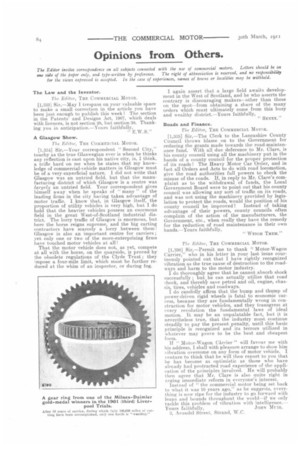Opinions from Others.
Page 16

If you've noticed an error in this article please click here to report it so we can fix it.
The Editor invites correspondence on all subjects connected with the use of commercial motors. Letters should be on
ene side of the paper only and type-written by preference. The right of abbreviation is reserved, and no responsibility for the views expressed is accepted. In the case of experiences, names of towns or localities may be withheld.
The Law and the Inventor.
The Editor, THE COMMERCIAL MOTOR.
[1,333] Sir,—May I trespass on your valuable space to make a small correction in the article you have been just enough to publish this week ? The section in the Patents' and Designs Act, 1907, which deals with licences, is not section 28, but section 38. Thanking you in anticipation.—Yours faithfully, A Glasgow Show.
The Editor, THE COMMERCIAL MOTOR.
[1,3341 Sir,—Your correspondent " Second City," touchy as the true Glaswegian ever is when he thinks any reflection is cast upon his native city, is, I think, a trifle hard on me when he states that my knowledge of commercial-vehicle matters in Glasgow must be of a very-superficial nature. I did not write that Glasgow was an untried field, but that the manufacturing district of which Glasgow is a centre was largely an untried field. Your correspondent gives himself away when he speaks of " many " of the leading firms in the city having taken advantage of motor traffic. I know that, in Glasgow itself, the proportion of utility vehicles is very high, but I do hold that the heavier vehicles possess an enormous field in the great West-of-Scotland industrial district. The lorry traffic of Glasgow is enormous, but here the horse reigns supreme, and the big carting contractors have scarcely a lorry between them ! Glasgow is also an important centre for carriers ; yet only one or two of the more-enterprising firms have touched motor vehicles at all!
That the motor vehicle does not, as yet, compete at all with the horse, on the quayside, is proved by the obsolete regulations of the Clyde Trust ; they impose a four-mile limit, which must be further reduced at the whim of an inspector, or during fog. I again assert that a large field awaits development in the West of Scotland, and he who asserts the contrary is discouraging makers—other than those on the spot—from obtaining a share of the many orders which must ultimately come from this busy and wealthy district.—Yours faithfully,
" SENEX."
Roads and Finance.
The Editor, THE COMMERCIAL MOTOR.
[1,335] Sir,—The Clerk to the Lancashire County Council throws blame on to the Government for reducing the grants made towards the road-naaintenance fund. With all due deference to Mr. Clare, is his county council using all the machinery put in the hands of a county council for the proper protection of its roads ? The Heavy Motor Car Order, and in fact all Orders and Acts to do with road locomotion, give the road authorities full powers to check the misuse of the roads. If, in reply to Mr. Clare's complaint as to the withdrawal of funds, the Local Government Board were to point out that his county council as allowing any sort of traffic on its roads, and was not using the machinery provided by legislation to protect the roads, would the position of his county council be improved? Instead of taking advantage of their powers, county councils often complain of the action of the manufacturers, the Government, etc., when really they have the remedy for the reduction of road maintenance in their own hands.—Yours faithfully,
"WEIGH THEM."
The Editor, THE COMMERCIAL MOTOR.
1.1,330.1 Sir,—Permit me to thank c! Motor-Wagon Carrier," who in his letter in your last issue courteously pointed out that I have rightly recognized vibration as the true cause of destruction to the roadways and harm to the motor industry.
I do thoroughly agree that he cannot absorb shock successfully ; but he can actually utilize that road shock, and thereby save petrol and oil, engine, chassis, tires, vehicles and roadways.
I do candidly affirm that the bump and thump of power-driven rigid wheels is fatal to economic success, because they are fundamentally wrong in construction for motor vehicles, and they transgress at every revolution the fundamental laws of ideal motion, It may be an .unpalatable fact, but it is nevertheless true, that the industry must continue steadily to pay the present penalty, until this basic principle is recognized and its terrors utilized in whatever may prove to be the best and cheapest form.
If " Motor-Wagon Carrier" will favour me with his address, I shall with pleasure arrange to show him vibration overcome on any form of motor vehicle. I venture to think that he will then report to you that he has become as optimistic as those who have already had protracted road experience of the application of the principles involved. He will probably then agree that Mr. Clare is also quite right in urging immediate reform in everyone's interest.
Instead of "the commercial motor being set back to what it was 10 years ago," as he suggests, everything is now ripe for the industry to go forward with leaps and bounds throughout the world—if we only tackle this problem of vibration with intelligence.—
You rs faithfully, JOHN MUIR. 3, Arundel Street, Strand, W.C.




















